The Fence Was Never Ours to Begin With.
Yesterday, in Day 69 of 100 Days of Community, we explored the difference between equality and equity. We grounded our understanding in a powerful visual:
Equality gives everyone the same box.
Equity gives people what they actually need to thrive.
But what happens after equity?
What happens when the fence is gone?
What happens when the need for the box disappears—because we’ve redesigned the whole damn system?
That’s where we are today.
Because on Day 70, we name this truth:
Liberation is not just about rebalancing power within broken systems. It’s about building new ones—rooted in ancestral wisdom, collective care, and future-forward vision.
Preview
“If equity gives us a better box, then liberation says: burn the box. Tear down the fence. Grow a garden where it once stood.”
In today’s micro-lesson, we explored how reclaiming ancestral wisdom is not about returning to the past—it’s about carrying forward the memory of what has worked, what has healed, and what has connected us to land, to community, and to each other.
We do not heal by erasing our history. We heal by remembering who we were before colonization demanded our forgetting.
Today’s Three Takeaways
Ancestral knowledge offers sustainable solutions.
Honoring the past while embracing innovation builds the future.
Reconnecting with cultural practices strengthens community.
In the full post, we explore:
Why ancestral wisdom holds answers to the crises of climate, isolation, and disconnection.
How food, language, land, and ritual can become radical acts of liberation.
Ways to reconnect with your own lineage—even if you feel distant from it.
On Mondays, all offerings are given with no paywall however if you need support on this journey? Scholarships are always available: scholarships@desireebstephens.com.
Ancestral Knowledge Offers Sustainable Solutions
Colonization severed our connection to land, body, and community.
Ancestral wisdom helps us remember the original design.
From Indigenous land stewardship to seasonal rhythms, ancestral practices have always centered balance, relationship, and respect.
They remind us:
We are not separate from the earth.
We are of it.
And when we build from that place, sustainability is not a trend—it’s a birthright.
At Home:
Reclaim ancestral foodways. Plant ancestral crops. Make meals that tell stories. Ask: What did my people eat before survival replaced nourishment?
At Work:
Design systems with longevity in mind. Use nature’s cycles as a framework for rest, growth, pause, and renewal. Not just hustle.
In Yourself:
Listen to your gut—literally. Rebuild your microbiome with ancestral foods. Wear fabrics that honor your heritage. Let your body remember.
Journal Prompt:
What wisdom lives in your bloodline that capitalism told you to forget?
Honoring the Past While Embracing Innovation
Liberation is not nostalgia.
It is alchemy.
It takes the sacred from the past and merges it with what is needed now.
You don’t have to choose between honoring your ancestors and using technology.
You can plant heirloom seeds in a smart-irrigated garden.
You can bottle peaches with your grandmother’s recipe—then share it in a group text.
In Community:
Start a hyper-local garden collective. Share crops based on capacity and care. Let your block become your food system.
In Policy:
Use traditional land use models to reimagine zoning. Advocate for mutual aid. Ditch the nonprofit industrial complex for people-powered ecosystems.
In Movement Work:
Integrate ancestral grief rituals. Bring drumming, dance, language, and earth-based ceremonies into the work of resistance.
Journal Prompt:
What ancestral practice could I bring into my modern life—and how would it shift my relationship to land, time, or people?
Reconnecting with Cultural Practices Strengthens Community
Culture isn’t just food and flags.
It’s rhythm.
It’s memory.
It’s a relational technology that connects us across generations.
And when we reclaim our cultural practices—language, ceremony, dress, food, music—we revitalize the nervous system of community.
In Yourself:
Learn your ancestral language. Or plant your grandmother’s favorite herbs. Or sing the lullaby you were sung—out loud. Out proud.
In Your Family:
Make dinner a sacred act. Tell stories. Ask elders to share memories. Let the children participate—not just watch.
In Your Neighborhood:
Host a “What Did Your People Grow?” seed exchange. Or a culture night potluck. Or a drum circle in your driveway.
Journal Prompt:
What cultural practice have I forgotten—and what would it feel like to bring it back?
Practice Your Praxis
Let’s get free. Not just in theory—but in rhythm, in ritual, and in soil.
Ancestral Audit
Write down what you know about your ancestors—recipes, songs, land, tools, grief. Then write down what you don’t know. Pick one to research this month.Lineage Garden
Grow one ancestral plant. Just one. Touch the dirt. Name it in your ancestor’s tongue if you can. Let it grow with you.Intergenerational Table
Host a dinner with three generations—if possible. Or recreate a meal from your culture’s past. Talk about what you’re reclaiming. Let liberation taste like home.Cultural Joy Ritual
Make a playlist of songs that reflect your lineage. Dance. Cry. Sing. Let joy be your archive.
Embodied Learning
Somatic Practice: Root Down, Rise Up
Stand barefoot in grass, dirt, or sand.
Close your eyes.
Feel into the soles of your feet.
Ask: What has been planted in me by those before me?
What do I want to grow now?
Breathe.
Feel the tug of lineage.
Let your body remember.
Journal Prompts:
What does ancestral joy feel like in my body?
What have I rejected from my lineage out of shame or survival?
What does liberation beyond the fence look like for me?
Final Reflection
We are not here to be copies of our ancestors.
We are here to continue what they could not finish—and to begin what they could not imagine.
Reclaiming ancestral wisdom is not about going backward.
It’s about going deeper.
Dig into the roots. Compost what no longer serves. Plant what was stolen. Harvest what is yours.
Because when the fence is gone and the soil is ours again,
we don’t just get equity.
We get liberation.
I’ll see you tomorrow for Day 71: Redesigning Leadership Structures for Equity
(And yes, we’re going to burn some hierarchies to the ground—with love.)
In solidarity and liberation,
Desireé B. Stephens, CPS-P
Educator | Counselor | Community Builder
Founder, Make Shi(f)t Happen
Join me tomorrow at 9:30 am EST for my next live video in the app




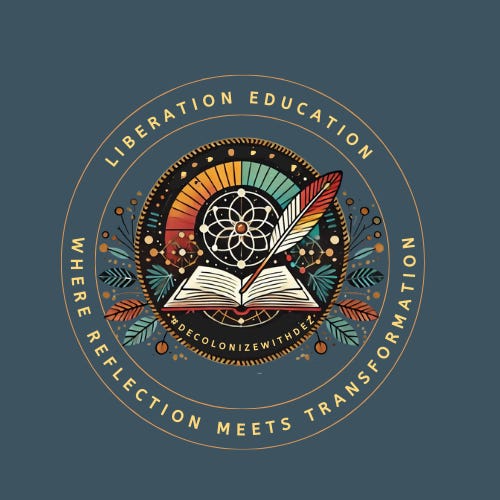

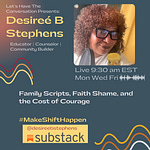


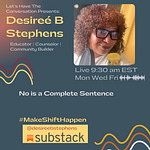

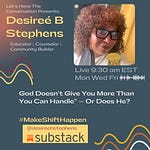
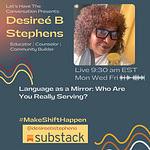
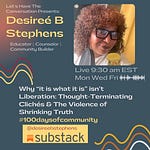
Share this post